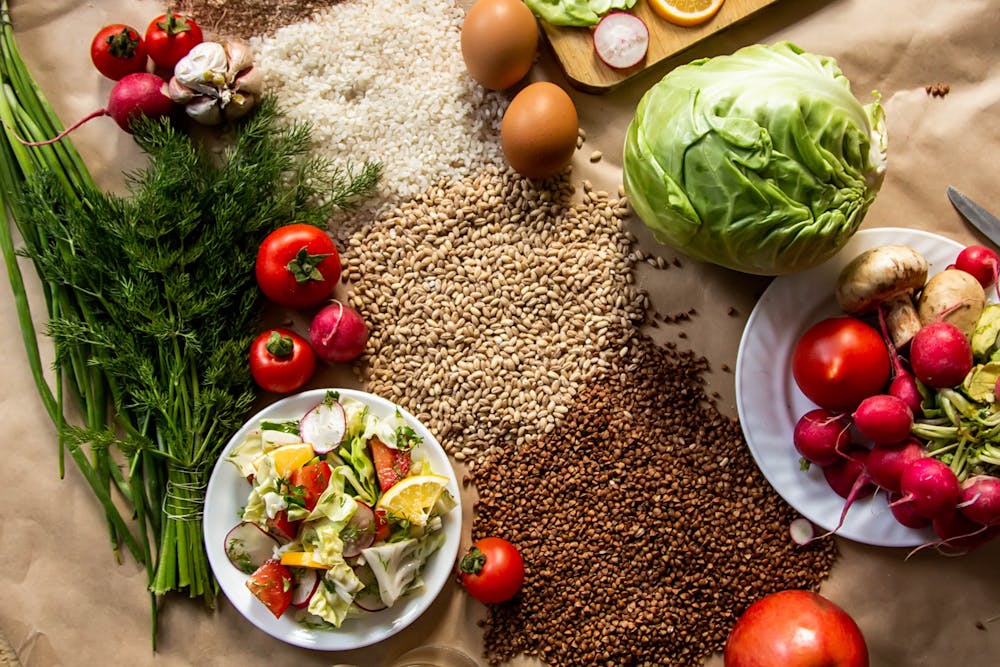About a year ago, I went vegan*. Consider the rest of this column the explication of that asterisk. At the time, I was working on a Barnstormers production that required baring it all (well, most of it, I guess) onstage. Aside from lifting weights six times a week, biking as often as possible and a few hours a day of choreography, I wanted to cut some calories in an effort to, um, tighten things up.
Eliminating most animal products from my diet seemed like the most efficient way to do so. Broscience told me that butter was more fattening than vegetable oils, that milk in my protein shakes jacked up their sugar content and that meat was by far the most caloric part of my diet. So I embarked on a vaguely vegan journey.
I caved and had a bowl of Ben and Jerry’s every once in a while, but I survived mostly on tofu and veggies for a solid eight weeks or so. Along this nascent plant-based course, I did more reading on veganism and came to appreciate the ethical, dietary and environmental repercussions of a meat-centric diet. Gradually, what began as a choice of weight-cutting expediency became more ideologically salient to me.
But once the production was over and my summer internship at a D.C. fine dining haunt began, I unfortunately had to give up my attempt at alimentary altruism. Our family meal (the staff supper most restaurants share before evening dinner service) always centered around meat, and I wasn’t about to pass up on the free dinner in a very expensive city.
In short, I gave up on it. Even outside of the restaurant, I was eating just as much meat as I had before. I alternated my post-shift takeout between a General Tso’s combo from around the corner and a killer Peruvian chicken spot down by the Capitol. Just as quickly as it had begun, it seemed that my attempt at veganism had ended.
Things changed at the end of the summer when the internship ended and my conscience returned. Once I could no longer count on a free bowl of ragù and rice every day, I had lost my best excuse to center my diet around massive quantities of meat. Plus, one event in the news pulled my narrow worldview open and forced me to confront the ecological consequences of eating this much meat.
Like the rest of the world, I was taken with the news of wildfires in the Brazilian Amazon. I’m no expert, but some of the minds I trusted most in the culinary world took to their online platforms to remind their followers that meat production is a key factor in Amazon deforestation, and, by a modest extension, those fires.
Eddie Huang, who made his name on fried chicken bao buns in Manhattan’s East Village, pledged to go completely vegan. Dominique Crenn, the first American woman to garner three Michelin stars, officially pulled meat from all of her restaurants’ menus indefinitely. So I decided to follow their lead and resume a diligently plant-based diet. Barring a couple late-night chicken fingers (I’m not a saint, people) I held fast to my goal of veganism for another five months or so.
Whenever I described this project to restaurant industry friends, they responded in a way I didn’t quite expect. They were curious about how long I hoped to keep it up, seemingly implying that my career would require eating at least a modest amount of meat and animal products.
And to be honest, I’ve realized that they’re right. As I transition from the Voices section to writing on Baltimore culinary happenings over in Your Weekend, I’ve recognized that it’s not fair to evaluate an omnivorous restaurant based solely on their vegan offerings. In the next few months, as I pursue writing and other gigs in the industry, it seems necessary to lighten up my commitment to plant-based eating.
The goal is to limit my meat eating to dining out and maintain veganism at home. I’ll defend this as conscionable for two reasons.
First, we know well that individual-level behavior is not driving climate change. Ask any member of Refuel Our Future or another of the diligent environmental groups on campus, and they’ll remind you that the vast majority of CO2 emissions come courtesy of the 100 leading corporate offenders in pollution.
Second, I think it’s important to recognize that, to the extent that individuals can affect environmental change, we shouldn’t depend on a few ecological saints to keep everything together. Rather, it’s important for everyone to do their part in lessening dietary dependency on meat and other animal products, as industry professionals and diners alike.





